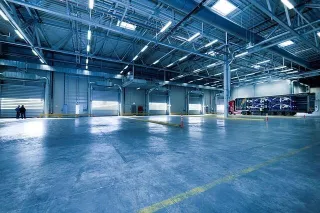Buying Commercial Real Estate
Frequently Asked Questions
What kind of return can I expect on this property?
As a buyer, you want to know the cap rate, cash-on-cash return, and projected net operating income (NOI)
✅ Cap Rate (Capitalization Rate)
Estimates the return on an investment based on the income it generates.
It tells you how quickly the property could pay for itself through income.
A higher cap rate generally means a higher return (but potentially more risk)
A lower cap rate often indicates a more stable or premium property
f(x): Cap Rate = Net Operating Income (NOI) / Purchase Price
Example: If a property has a $100,000 annual NOI and the purchase price is $1,000,000, the cap rate is 10%
✅ Cash-on-Cash Return
Measures the actual return you’ll receive based on the cash you invest out-of-pocket, helpful when financing is involved
It's the return based on your down payment and upfront costs.
Helps you compare deals where financing structures vary Includes effects of mortgage payments, unlike cap rate
f(x): Cash-on-Cash Return = Annual Pre-Tax Cash Flow / Total Cash Invested
Example: If you invest $250,000 in cash and your property gives you $25,000/year in cash flow after debt service, your cash-on-cash return is 10%
✅ Projected Net Operating Income (NOI)
The total income the property generates from rent and other sources minus all operating expenses (but before debt service and taxes)
It is the property’s true income potential. A key driver of valuation for income-producing properties
Used to calculate cap rate, debt coverage ratio, and property value
f(x): NOI = Gross Rental Income + Other Income – Operating Expenses
Example: If a building collects $120,000/year in rent and incurs $40,000 in expenses, the NOI is $80,000

How do I finance a commercial property purchase?
Financing can come from:
Traditional commercial lenders or banks
SBA 504 or SBA 7a loan programs
Private lenders
Portfolio lenders
Commercial mortgage brokers
Expect a higher down payment than residential real estate — typically 20% to 35% — and lenders will assess your credit, experience, and the projected income of the property.
If your business is buying the property, you will create a holding company to "hold" the property and lease it back to your business!
What is due diligence and why is it important?
Due diligence is the research and verification phase before you finalize a commercial real estate purchase. It protects your investment by uncovering financial, legal, and physical risks.
Key areas include:
Financial: Review leases, rent rolls, expenses, CAM charges, and tax records
Legal: Confirm title is clear, no liens or zoning issues, and leases are assignable
Codes: Fire codes, Water/indoor sprinkler systems, Septic, tie-in to state run roads: All need to be investigated in addition to local city ordinances
Physical: Inspect the building (roof, HVAC, structure), and run environmental studies if necessary
Environmental: Some properties will require an EPA Phase I or II inspections, adding to the time for closing
Why should I invest in commercial real estate?
Commercial real estate offers opportunities to generate passive income, build long-term equity, receive tax benefits, and diversify your investment portfolio. It’s also a powerful tool for business owners to secure space and control operational costs.
What types of commercial properties can I buy?
You can purchase a wide range of property types based on your goals:
Office buildings for corporate or professional services
Retail spaces like strip centers, storefronts, and shopping plazas
Industrial and warehouse facilities for logistics, manufacturing, and distribution
Medical offices and healthcare clinics
Multifamily and apartments for residential income
Senior living communities with specialized care
Hospitality properties including hotels and motels
Self-storage units for steady cash flow
Land for development, farming, or future investment
What should I look for in an industrial or warehouse property?
Location and accessibility are critical, but so are specific features:
Docks:
Dock-High Doors: Match the height of a truck trailer for efficient loading
Grade-Level Doors: Allow vehicles to drive directly into the building
Ramp Access: Versatile for smaller deliveries or equipment loading Recessed Docks: Built below ground for compact, efficient delivery access
Overhead Roll-Up Doors: Common for flexible industrial use and drive-in bays Also consider ceiling height, floor load capacity, truck turning radius, and proximity to highways or shipping routes.
Delivery Drop Off Area: Do you need a turn-around area for delivery trucks
Commercial equipment: Does the city have any ordinances re: commercial trucks, equipment, trash containers, etc and where they can be parked? Some cities require a fenced area to hide items from view, others require lots to be clear in the front of the building for clients/customers. Check with city zoning!
HVAC and electrical needs! (e.g., Indoor sporting courts often need special lighting and HVAC!)
Misc: Alarm systems, wiring for security and internet

Who should be on my team when buying commercial real estate?
Because commercial transactions are complex, you’ll want a trusted team:
Commercial real estate broker with local market knowledge and who has a relationship with lending options/SBA financing teams, title companies to hold earnest money, do title work and transfer ownership/title at closing.
Real estate attorney in attorney states, or if you just want to review additional legal issues
CPA or financial advisor to plan for tax implications
Property inspector and environmental consultant to assess the building condition and compliance
If renovating, doing tenant improvements (TI): a General Contractor, Commercial Plumber, Electrician, Roofer. Your broker should have a list of these resources

What happens at closing?
Once due diligence is complete and financing is secured:
Final contracts are signed
Title is transferred at title company
Funds are wired
Tenants (if any) are notified, and property management begins
If you are moving in, you might have some tenant improvements (TI) to complete before opening shop.
Your broker and team will guide you through the transition to ensure a smooth handoff.

How can you help me through the process?
We specialize in helping buyers find the right commercial property based on your investment or business goals.
From search to closing, we’ll handle:
Site selection and property tours
Financial analysis and valuation
Offer negotiation
Due diligence management
Coordinating your professional team
Whether it’s your first deal or your tenth, we’ll make the process clear and successful.

Why is location so important when buying commercial real estate — and what should I look for?
Location is still the #1 factor in commercial real estate — Here’s what savvy investors and business owners evaluate:
Foot Traffic: For retail or hospitality, the number of people passing by your location can directly impact revenue
Access to Transportation: Proximity to highways, public transit, and major roads affects employee commutes, deliveries, and customer convenience
Population Trends: Buyers look for areas with growing populations, rising incomes, or favorable demographics to support long-term growth
Zoning Changes: Know what the property is zoned for — and whether the city plans to change zoning or land use in the near future
Nearby Developments: New housing, commercial centers, or infrastructure projects nearby can boost property value and tenant demand
We help you analyze these location factors using real-time market data, city planning tools, and local insights — so you can make an informed decision, not just a hopeful one.

Are the tenants stable — and what are the lease terms?
For investment properties, the quality and stability of tenants can make or break the deal. You want to know whether the income stream is reliable — and for how long you can count on it.
Look for:
Tenant Mix: Are the tenants national brands, local businesses, or professional service providers? A healthy mix can reduce risk
Lease Duration: Longer leases typically offer more predictable cash flow and reduce the risk of vacancy
Renewal Options: Buyers check if tenants have the right (or obligation) to renew their lease, and under what terms
Rent Escalations: Scheduled increases (annually or every few years) help hedge against inflation and boost income
Payment History: A clean record of on-time rent payments and no defaults builds confidence in tenant performance
As part of our due diligence, we review all active leases, tenant financials (when available), and lease structures so you understand exactly what income is in place — and how secure it is.

What are the hidden or ongoing costs I need to plan for?
Think about taxes, insurance, repairs, and property management — they all affect your bottom line.
Consider if the property needs asbestos abatement, radon mitigation, lead paint removal or other environmental issues that need to be mitigated
Consider if need to pay for the tenant improvements
If you're ready to explore your next investment or just want help navigating the process, let’s talk. Once we find the right property for you, we will look at all of these costs and see if it works for you!

We’ve Created A Beginner-Friendly Guide
Get your free guide to making sense of the Commercial real estate buying, selling and leasing, with additional innovative strategies and resources to streamline the process!


© Copyright 2025. Business 2 Eternity Brokers
All rights reserved
2022 All Rights Reserved.








